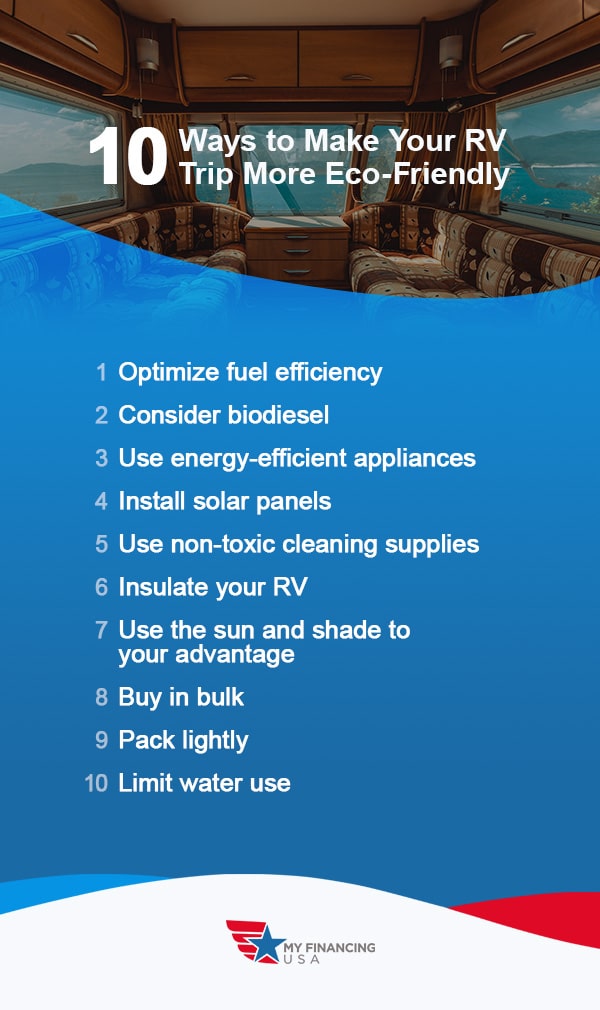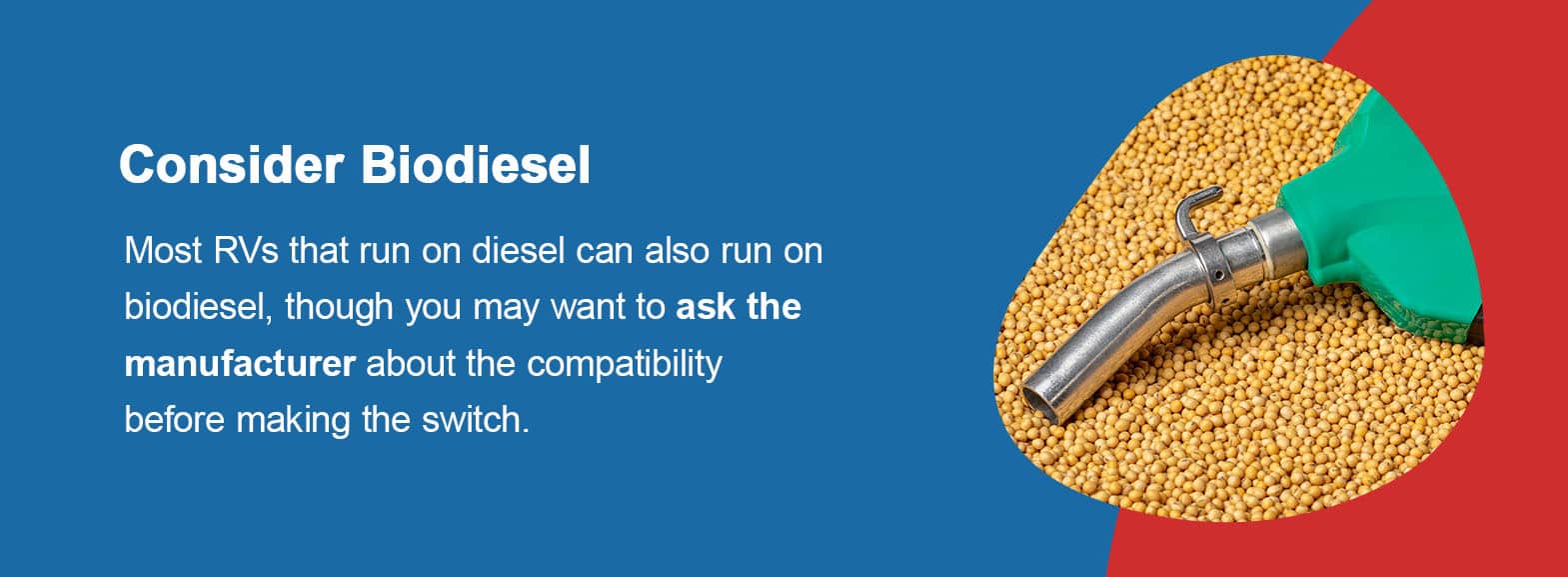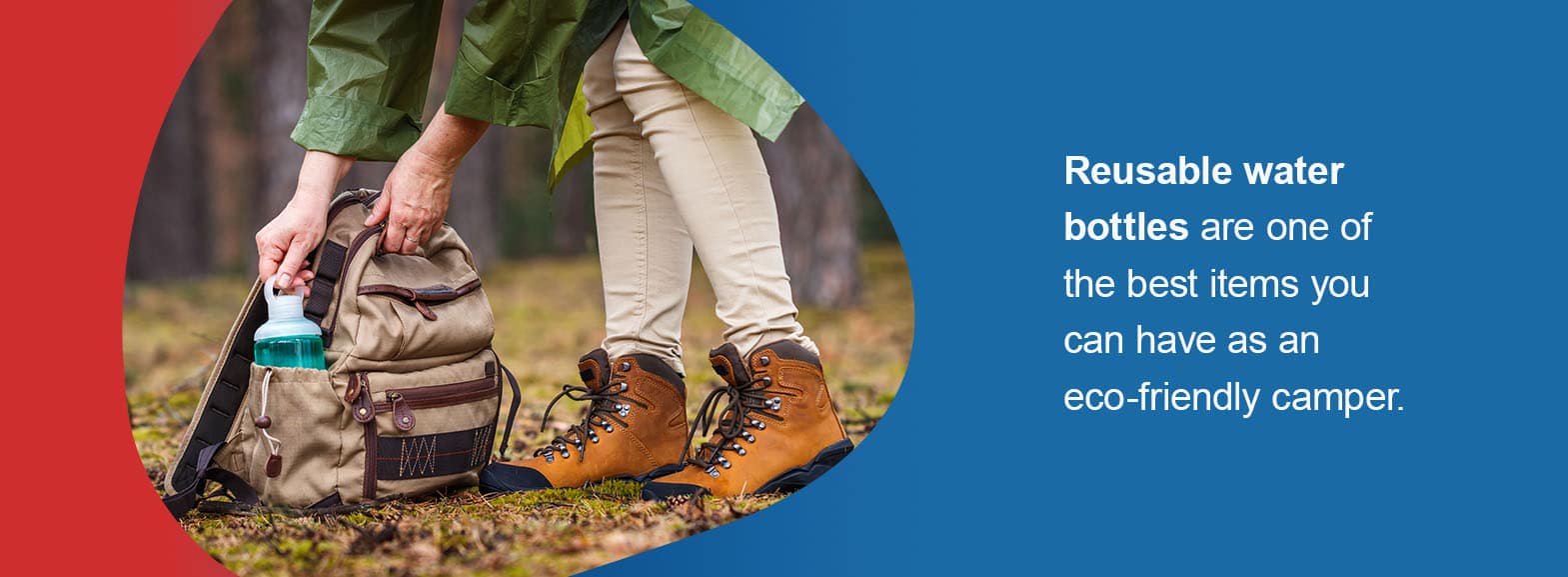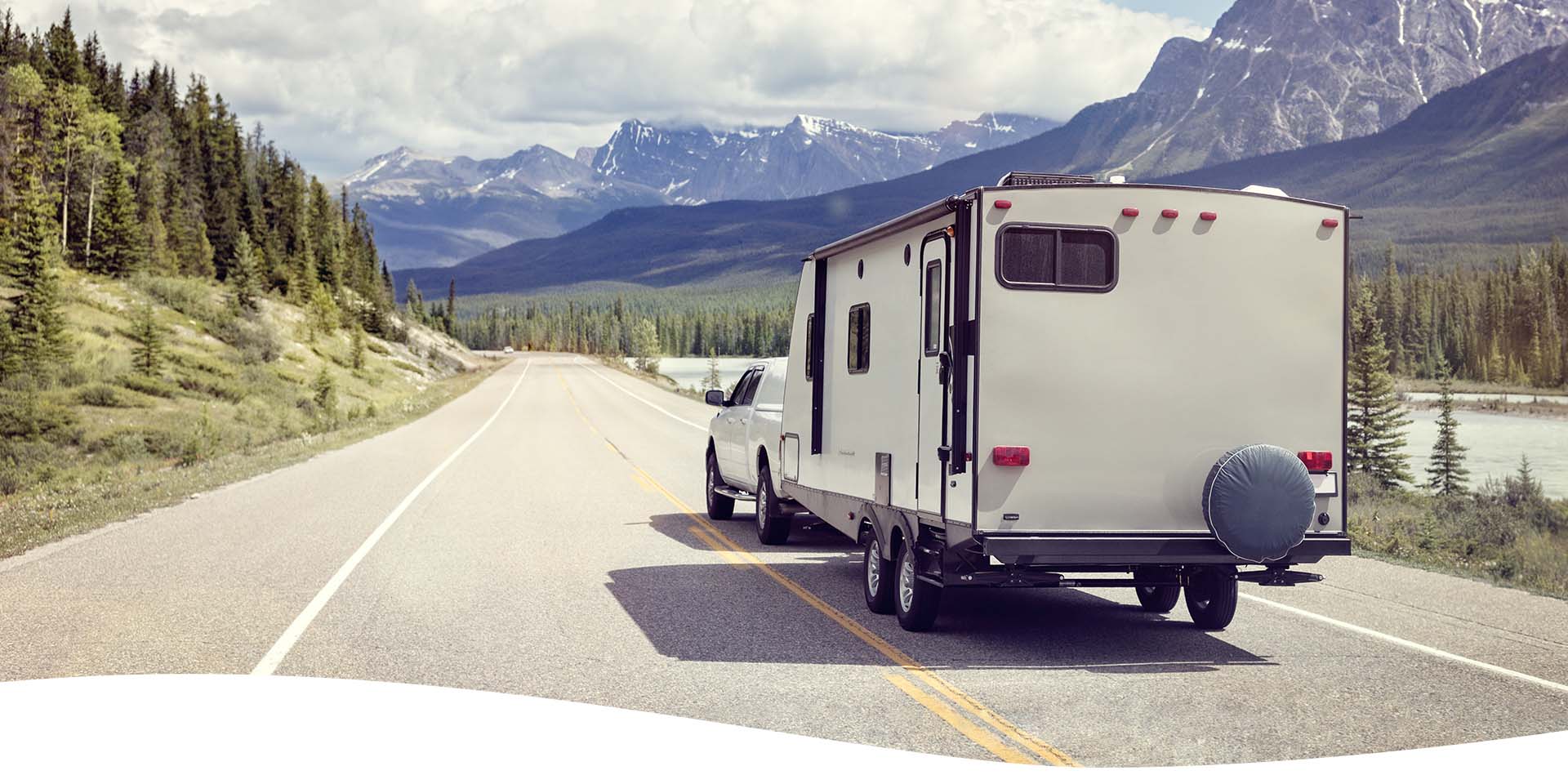Quick Navigation
The RV industry has grown significantly as more people look for ways to travel and enjoy nature. Unfortunately, traveling with an RV can pose some environmental issues — for example, they tend to get poor gas mileage and often have large carbon footprints. Luckily, you can control your environmental impact while camping and traveling in an RV. From where you park your RV to the type of fuel you use, you can make your RV more eco-friendly in several ways.
Find out how to make an RV more energy efficient and more ways to be an eco-friendly camper.
10 Ways to Make Your RV Trip More Eco-Friendly

Whether sightseeing across the country or taking a weekend camping trip, there are several ways to create an eco-friendly RV and reduce your environmental impact while traveling. Here are several tips for traveling in an eco-friendly motorhome and minimizing your RV's carbon emissions.
1. Optimize Fuel Efficiency
Because RVs are large, heavy vehicles, they typically get poor gas mileage and burn through fuel quickly. In many ways, this is hard to avoid given the nature of these vehicles, though there are a few ways to optimize your fuel efficiency to travel more sustainably.
One of the best ways to optimize fuel efficiency is driving slower than you may normally drive on the highway. While you may be itching to get to your destination, the faster you drive, the faster your RV will burn fuel. Aim for consistent speeds between 55-65 mph to get the most miles per gallon.
Additionally, use cruise control when driving long stretches of road to keep your speed from fluctuating and burning more fuel. Optimizing your fuel efficiency leads to more sustainable travel and increased savings for you, as you'll be filling up your gas tank less frequently.
2. Consider Biodiesel

Many RVs run on diesel fuel, which is a traditional, nonrenewable petroleum product. Burning diesel fuel is unsustainable and contributes significantly to air pollution and carbon emissions. Consider switching to biodiesel, a clean alternative to traditional diesel. Biodiesel is often made of recycled restaurant grease, vegetable oils and animal fats, making it a biodegradable and renewable fuel source. Switching to biodiesel helps reduce your RV's environmental impact.
Most RVs that run on diesel can also run on biodiesel, though you may want to ask the manufacturer about the compatibility before making the switch. There are over 800 biodiesel fueling stations across North America, providing RVers with a sustainable way to refuel.
3. Use Energy-Efficient Appliances
You can prioritize energy efficiency in numerous ways, including the appliances in your RV. If your RV has appliances like refrigerators or microwaves, consider whether they're contributing to an overall energy-efficient RV. If you spend significant time using your RV and the appliances within it, you may want to budget for replacement appliances. Older appliances tend to be energy leaches — using up energy even when they're not in use. Replacing older appliances can help reduce your energy consumption.
Another trick is to unplug any unnecessary appliances when they're not in use. This prevents them from using energy while in idle or sleep mode.
4. Install Solar Panels
Using renewable energy sources is another effective way to increase your RV's energy efficiency. For example, installing solar panels provides a sustainable way to power your appliances, electronics and other electronic devices. Solar panels convert the sun's renewable energy into clean, usable electricity.
RV solar panels can be mounted to your roof or come in portable versions that can be set up as needed. They also come in flexible or rigid styles, offering options for how the panels will lay on your roof. For example, if your RV roof is curved, flexible solar panels can be used to ensure they lay flat.
5. Use Non-Toxic Cleaning Supplies
Whether you're cleaning your septic tank or the interior of your motorhome, using non-toxic, eco-friendly cleaning products helps reduce the risk of spreading harmful chemicals into the environment while you're on the go. Harsh chemicals can harm the environment and your health when used in small spaces like a camper.
Regarding your septic tank, opt for enzyme-based cleaners and treatments. They tend to work just as well and have less of an environmental impact because they lack harmful pollutants. Cleaning your RV is necessary to maintain its condition, so ensure you use eco-friendly products to reduce chemical pollution.
6. Insulate Your RV
Another great way to improve your RV's energy efficiency is to ensure it has effective insulation. Like a house, your RV's insulation helps keep warmth in when it's cold and cool air in when it's hot. A properly insulated RV is more energy efficient because it keeps itself comfortable without using additional energy to heat or cool the space.
For example, without insulation, your RV would need to continuously run the heat to maintain a comfortable temperature inside when RVing in the winter. With insulation, more of that heat is retained, allowing the heat to run less often. Consider how you can insulate your RV walls and windows to prevent air from escaping.
7. Use the Sun and Shade to Your Advantage
The less often you have to run your air conditioning and heat, the more energy-efficient your RV can be. A great way to reduce how often you need to run your heat or air conditioning is to take advantage of the sun and shade. On cooler days, parking in the sun can help naturally heat up your RV, and on warmer days, parking in the shade can help keep your RV cooler. While this may seem like a small trick, it can significantly reduce your energy use.
8. Buy in Bulk
While stocking your RV with food and other products, consider buying in bulk. Buying food items like granola, rice, nuts and more in bulk quantities tends to be much more efficient and cheaper than individually packaged foods. You can buy exactly how much you need, reduce waste and limit your grocery stops.
For example, rather than just purchase a bit of food to hold you over until your next stop or destination, shop for the entire trip at once, buying in bulk to stock up. Doing so can save you money and time over the course of your trip.
9. Pack Lightly
You likely have numerous “just in case” items in your RV that rarely, if ever, get used. Loading your RV down with these types of supplies creates unnecessary weight that can impact your fuel efficiency. When traveling in an RV, it's best to pack lightly and only bring necessities. This is another way to optimize your fuel efficiency and create more space in your RV.
Similarly, consider getting a smaller RV. They weigh less, consume less fuel, have less space for unnecessary items to collect, and are easier to heat and cool.
10. Limit Water Use
Conserving water on the road is equally important as conserving water when at home. Be sure to limit how much water you use when showering or washing dishes. Taking short showers and limiting how often you have to do dishes can help you save water. Luckily, most RV toilets are designed to use limited amounts of water, so the main areas to limit yourself in are showers and sink use.
You may also consider how you heat your water, which can use a lot of energy. For example, when using hot water for cooking, consider warming it over a fire instead of using a stove or hot water heater.
Environmentally Friendly Camping Tips
Being an environmentally friendly camper goes beyond your traveling in your RV — being an eco-friendly camper also involves your actions at your campsite. In addition to making your RV more eco-friendly, consider these tips for sustainable camping regardless of where you park your RV.
Practice Leave No Trace Policies
If you're a seasoned RVer or camper, you may have heard of the leave no trace (LNT) principles and guidelines for enjoying nature while reducing your environmental impact. When camping, be sure to practice the seven LNT policies to minimize your impact while enjoying the outdoors:
- Prepare and plan ahead: Preparation helps ensure your safety and minimizes damage to environmental resources.
- Be considerate of others: Consideration allows everyone to enjoy their experience.
- Minimize campfire impacts: Leave no evidence of having had a fire.
- Camp and travel on durable surfaces: The goal here is to avoid damage to surface vegetation and waterways.
- Leave what you find: Leave areas as you found them so others can also discover them.
- Dispose of waste properly: Consider how various types of waste can impact wildlife, water and other people.
- Respect wildlife: Keep your distance from wildlife and their food and water sources.
Reduce Waste
Reducing the amount of waste you produce while camping helps reduce the impact that waste has on the environment. There are many ways to do this, including buying bulk products, though one of the best ways to reduce waste while camping is to avoid disposable and single-use products. For example, paper plates, plastic cutlery, plastic water bottles and other similar items may be convenient, though they quickly add up and create tons of waste.
Rather, opt for reusable kitchenware and water bottles. You'll have to wash these, though you'll significantly reduce the amount of waste you produce while camping. Reusable water bottles are one of the best items you can have as an eco-friendly camper. You can refill them countless times and in many cases, they're more durable and safe to take camping than single-use water bottles.

Properly Dispose of Waste
As much as you can reduce your waste production, you'll still have some waste and trash that you'll need to dispose of properly. Throw trash away in designated receptacles at campgrounds or parks and if you're camping where there aren't trashcans or dumpsters, always pack your trash out with you. Use designated trash bags for waste and recyclables to take them home or to your next destination to keep your trash out of the environment.
Also, remember that you should never burn your trash while camping. While you may think this is a good way to get rid of your trash and waste without hauling it out, burning it out in nature releases harmful pollutants into the environment and atmosphere. You should also be mindful of biodegradable waste, as some of it can take years to degrade completely. In other words, simply taking it home to dispose of properly ensures you've left no trace.
Make Your Own Food
Look for snacks or meals you can make yourself. For example, trail mix, protein bars, granola bars and other similar snacks are common for campers to bring on their trips. With enough planning, you can make these snacks on your own and bring them with you rather than buying them in individual wrapping. Making your own food can help reduce waste and save you money.
Also, consider making your meals ahead of time. While this isn't always possible, especially for long-distance road trips, you can easily pre-make meals for a weekend. Doing so makes eating on the road easier and simply heating up your meal is convenient. Premade meals often occupy less space in your fridge or pantry, making space for other necessities or simply lightening your load rather than packing all the ingredients.
Choose Natural Body Products
Similar to how your cleaning products can pollute the environment, so can the body products you use while camping. Water-soluble products like makeup, lotions, bug spray and sunscreen dissolve in water, which makes them easy to wash off. Unfortunately, this also means they'll easily pollute any body of water you access. Many body products also contain chemicals or ingredients that are harmful to nature.
Opt for natural body products, as they're made with natural, organic ingredients that are safe to use when camping. Use body wash and shampoo bars instead of bottled products — you can cut down on landfill waste while also saving tons of space, a definite win for avid campers.
Many natural products are just as effective as traditional body products, they're just more environmentally friendly. You should also bring biodegradable soaps and toothpaste that will be easy on the environment and break down quickly.
Exercise Fire Safety
Campfires are often considered a staple of camping, though they can be detrimental to the environment when not handled properly. When enjoying a campfire, you should only build them in designated fire pits. This helps keep the fire contained and at a manageable size. Be sure to keep flammable objects away from the fire, including environmental elements and your belongings. Never leave a fire unattended — if you're leaving the fire, put it out with water and wait to ensure all flames are out.
Also, do your research to find out if there are any fire bans in your area, and never light a fire in an area where the fire risk is high.
Finance or Refinance an RV With My Financing USA

Hitting the road in an RV offers more traveling freedom and ways to enjoy nature. At My Financing USA, we make it quick and easy to get approved for RV financing and refinancing with quality lenders nationwide. We'll help you get rates and terms that work for your budget and credit score, making RV travel attainable for you. Fill out our secure online application to get started today and get out on the road sooner.
Additional Resources on RV Financing:
- Road Trip Food and Snack Ideas
- How to Plan Gas Stops on a Road Trip
- How to Plan a Road Trip on a Budget
- Road Trip Food and Snack Ideas
- Road Trip Game Ideas
- How to Find Safe Parking for Your RV
- Common RV Mistakes and How to Avoid Them



